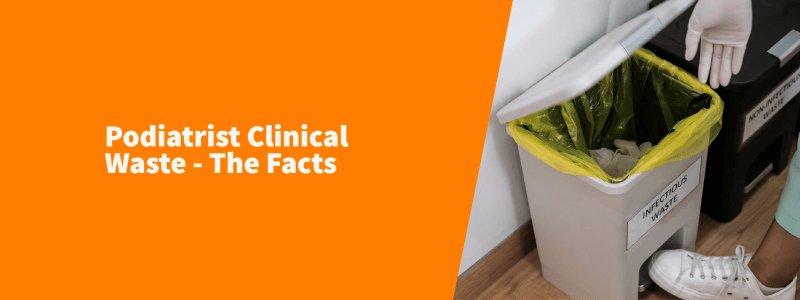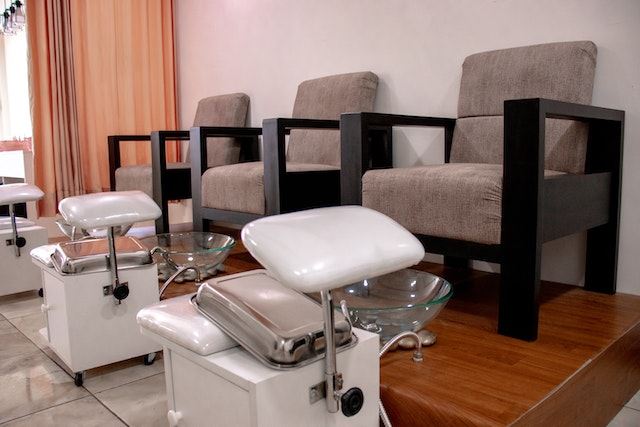Podiatrists conduct the treatment of feet and associated ailments. Whether a podiatrist is dealing with minor or major issues, they are likely to create a range of waste types which need to be disposed of properly. That’s where clinical waste disposal becomes important.
What is Proper Waste Management?
When we say ‘properly’, we mean waste that is being safely disposed of and adhering to UK guidelines.
Failure to comply with the range of waste disposal laws set out by regulatory bodies could result in fines, prosecution or closure of your practice, so it’s best to get clued up on safe waste disposal as soon as possible.
Click Here to Call for an Instant Clinical Waste Quote
Podiatrist Waste Types
Much of the waste produced in podiatry practices falls under the clinical waste spectrum, which breaks into different classifications of waste types.
Examples of the waste types podiatrists may deal with include:
Offensive Waste
Offensive waste (EWC 18-01-04) is defined in the Controlled Waste Regulations 2012 as being waste which is unpleasant and may cause offence to the senses.
This waste is non-infectious, but only a few specific waste types are suitable to be placed into an offensive waste sack without strict and carefully documented procedures being put in place beforehand.
In the case of podiatry, this may include protective garments and outer dressings that aren’t contaminated with bodily fluids – e.g. gloves, gowns, masks and coverings.
Hazardous Waste
Hazardous waste types fall under a huge spectrum, splitting into various subcategories. Unlike offensive waste, hazardous waste is anything that presents a substantial threat to public health or to the environment.
Generally, hazardous waste includes substances that must be disposed of with care to minimise potential risks. In the case of podiatry, this could include things like cleaning chemicals or potentially infected dressings.
Sharps Waste
Sharps refers to any sharp device with points or edges that may cause punctures or cuts from medical instruments like needles, syringes and lancets, to more domestic items like blades, scissors and broken glass/crockery/plastic. These fall under hazardous waste because of the dangers they pose.
Sharp items are especially hazardous when contaminated, as they pose a risk of infection. Sharps soiled by blood, body fluid or medication are classed as biohazardous material.
Different types of sharps bins are distinguished by their lid colour, which determines whether the sharps contained are non-pharmaceutical, partially discharged/empty or contaminated with cytotoxic/cytostatic medicines.
Click to Call for an Instant Clinical Waste Collection Quote
Pharmaceutical Waste
Another form of hazardous waste, pharma waste (EWC Codes 18-01-08 and 18-01-09) refers to medicines or substances that contain or have come into contact with medicines, including cytotoxic and cytostatic wastes.
To ensure public safety from out of date medicines and other controlled drugs, there are pharmaceutical bins that can be permanently sealed once full.
General Waste & Recycling
Like any business, podiatrists also produce waste that doesn’t fall under specific categories and can simply be recycled or binned as normal – this includes general rubbish, from clean packaging to lunch break leftovers.
For further information on Clinical Waste Management in all sorts of businesses (including a more in-depth look at regulatory bodies, laws, bin types and disposal methods) check out our Clinical Waste Guide here.
Clinical Waste Services from Direct365
Whether you’re a podiatrist or in another profession, our cost-friendly Waste Management services have got you covered.
Our services include all the waste types mentioned above and more. Don’t worry if you only need collections for one waste type, or if you have a whole range of wastes to deal with – our bespoke contracts allow you to create a custom package specific to your business, so you only pay for what you need.
Regulation Bins
We provide bins and containers that meet the specific UK standards for hazardous substances, featuring secure lids, puncture-proof material and leak-resistant seals.
Waste Transfer Notes
With every waste collection that contains hazardous material you’ll receive a free consignment note detailing the type of waste collected, its EWC code, the quantity, components, hazard code and container type. This means you can prove your business’s Duty of Care with ease.
UK Waste Experts
Confused about anything? Don’t worry! Feel secure in the hands of our professional and trusted customer care team, offering guidance and support for businesses nationwide.
For more details on our waste services, and to hear about how we can save up to 30% on clinical waste collection, fill out the form below!


